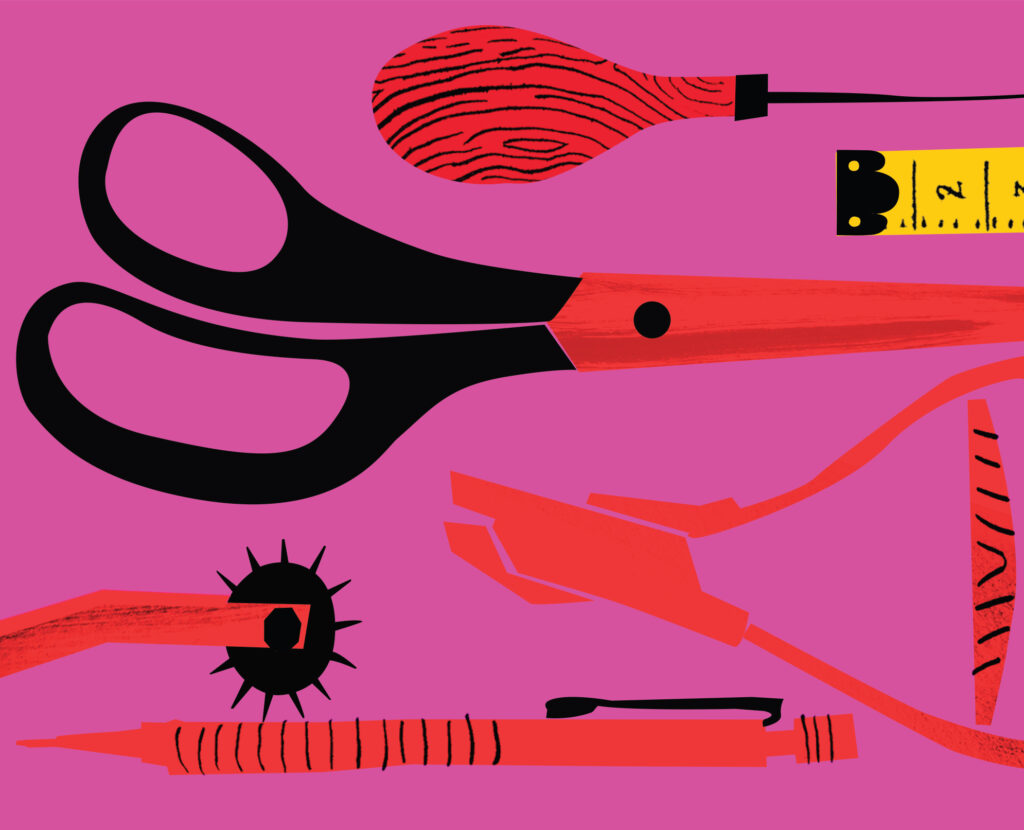
I am a manual patternmaker and as such use very little equipment. It’s usually the same old things repeatedly. But those few key items, I find, are so important that if just one is missing I find my concentration gone.
So in this post, I would like to share with you, my most valued pieces of equipment that I can not live without.
My patternmaking ruler – I use no other rulers, just this one. I have made peace with its schizophrenic personality of inches and centimeters and barely there markings. If I’m being perfectly honest, I don’t know how to use all the other rulers that are associated with my trade because I do just fine with the bog-standard version I have.
Scissors – I own a pair of fabric shears that are old tailor shears from the 1940s and are still going strong. But they will never touch my cardboard! Cardboard destroys fabric scissors so buy yourself a pair of paper scissors that you will use just for your patterns. They should be sharp enough to cut precisely and light so you don’t get hand cramps or are in danger of getting repetitive strain injury ( RSI ). I use 10-inch paper scissors because i can fit all my hand into the handle. ( very important ) I like a bigger blade 10″- 12″ so I can cut faster and finish the job. There are scissors or shears available for left-handers. And also specifically designed shears for patternmaking. Which I am seriously considering buying.
Pattern Notcher – What’s a pattern without notches? How would I communicate whether it’s 1 cm or 1.5cm? This tool is up there in the top 3 of necessary items for patternmaking.
Pencil – whether you prefer the traditional or the mechanical kind it’s up to you. Curiously I used to be quite fussy with my pencils but as time has gone on I will accept anything with a good point. For faster pattern making it’s great to have a mechanical pencil, .7mm or a .9mm in width with a medium darkness to it like a 2B graphite lead. The .7mm or .9mm extra thickness helps it to deal with tracing of cardboard and it doesn’t break so much. The darkness is just so I can see on the caramel-coloured cardboard.
Mushroom hole maker – This is one of those tools that if you don’t do patterns you simply can’t figure out its use. Looks like a mushroom and it just lives exclusively to make a little hole in the cardboard to signal the end of the dart. That’s it, that’s all it does, but I use it all the time.
The Tape Measure – I like the Italian ones made of softer plastic with non-garish colours. You look at the tape measure so much that it should at least be easy on the eye. Bright colourful ones are fun too, though. Depends on your mood.
The Stiletto or Awl – also doubles up as a weapon! Handy for holding down cardboard or marking holes. I use this tool to measure seams together with my tape measure, score grainlines, and trace or copy a garment shape.
Tracing wheel – I personally barely use this tool but I find if you have to get a pattern out of a magazine like Burda etc. it is really handy.
Pattern hole punch – Now I’m getting into the luxuries. This tool is just great for making perfect holes so that you can professionally hang your patterns. Quite heavy, it’s made of iron and very industrial looking. This tool can be screwed into the cutting table to keep it stable.
Pattern Hooks – Not everybody uses these but they just make life easier. And if you have to get a pattern out repeatedly then they are a must. Here in Spain, they don’t seem very popular, people instead prefer to use an oversized bobby pin with a hook at the top. But I find the hook doesn’t fit a standard rail then your choice is either to hang them off coathangers or to install a customised rail. A bit messy and not very practical.
Leave a Reply